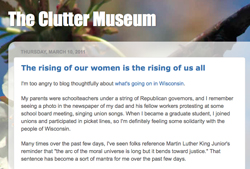Although this is my first “summer break” in years–I was in staff positions from 2006-2010, and I taught during summers when I was a grad student before then–I’m working harder at research and writing than I have in a long time. You see, I’m considering this my Summer of Strategy.
Lucas is in preschool through mid-August, so I have childcare taken care of for this summer–but it’s the last one where that’s assured, so I want to get as much writing done as possible.
My department’s (admittedly kind of low) bar for tenure is three articles in good journals. Before I arrived here, I published one that will carry some weight, but I still want to have at least three strong articles when I go up for tenure in year 4 or 5 (yes, it’s quick here).
I sent out one article yesterday–a major revision of the article where one reviewer said I needed to familiarize myself with the work of (ahem) Leslie Madsen-Brooks. I reacquainted myself with my own work, cut about 70 percent of the content from the article, recrafted its argument, and rewrote the rest. It was a beast, and I’m glad to send it off, though I do so feeling both relief and dread.
Today I’m looking at another article I revised a bit earlier this spring. It looks to be in pretty good shape, so I’m hoping to get it out in the next week or so.
I’m also working on a giant grant. Seriously, it’s enormous in every sense. Overwhelming, really.
Plus I’m traveling to archives in Southern California in July ,and maybe in early August as well, for a third article. The research for this third article–which remains a largely undefined nebulous mass–is making for some interesting reading. This morning I was reading the annual report of the California State Board of Horticulture for 1889. It’s a hoot and a half, and florid in the way of feminist utopian novels written during the same era. A sampling from Mrs. Flora M. Kimball’s welcome address:
You come to us, gentlemen, not as horticulturists alone, but as apostles of the gospel of fruit, trees, and flowers. We recognize the truth that planting trees, garnering fruits, and developing new forms of vegetation, is not your highest work. A richer harvest than the merely economic awaits your labors. We rejoice in your presence to-day, not so much from anticipated benefits to our horticultural industries as from the richer harvest of morality, beauty, and religion that will spring from the scattered seed of thought you have brought to us. No nature is so depraved that it does not respond to the refining influence of trees, flowers, and fruits. (331)
God, I love the 1880s and 1890s U.S. I need to spend more time there.


Hoping you will be in Boise when I pass through this summer- indefinite now, but sometime around mid-July seems likely.
Must raise bar. 😉
We should talk about horticulturalists sometime! I’m writing an article about the “orchard boom” in Southern Oregon 1880s-1920s.